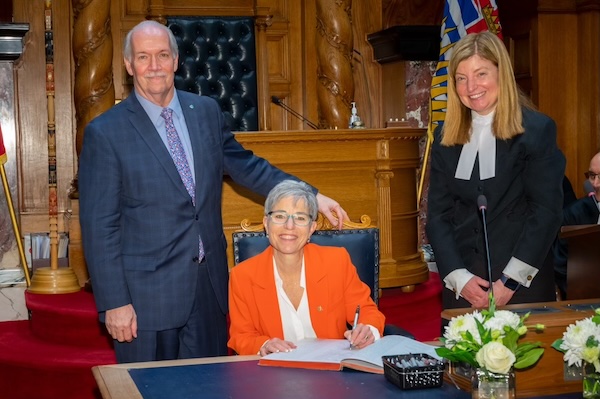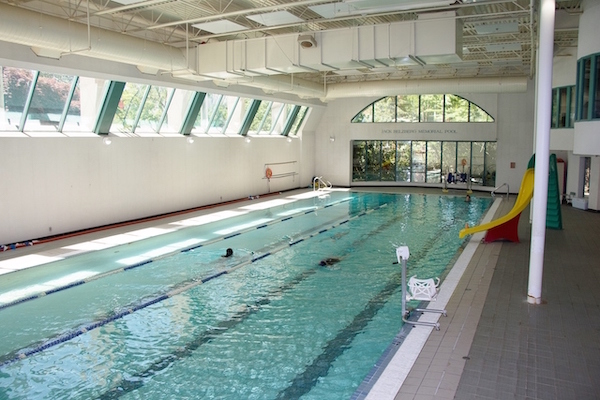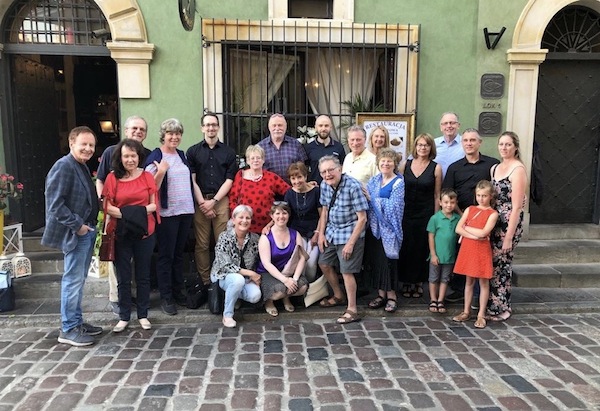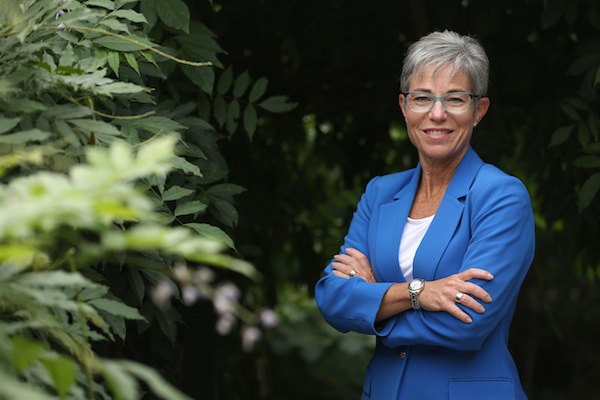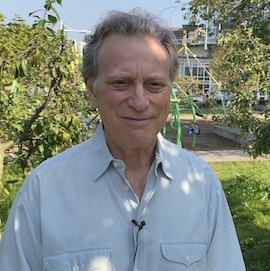Selina Robinson, centre, with then BC premier John Horgan and Kate Ryan-Lloyd, clerk of the Legislative Assembly, at Robinson’s swearing-in ceremony in 2017. (photo from Selina Robinson)
Selina Robinson says she was fired from the British Columbia cabinet. Premier David Eby says she quit.
This is merely the tip of an iceberg in the conflicting stories that have roiled BC politics since Robinson’s cabinet career ended in February – and which burst into an even bigger storm when she left the New Democratic Party caucus March 6 with an incendiary letter to caucus colleagues.
Whether Robinson jumped or was pushed, Jewish community leaders and opposition politicians are denouncing what they say is a double standard, with multiple people – including the premier – getting second chances for remarks that were at least as impolitic as Robinson’s.
In a wide-ranging interview with the Independent, Robinson maintains the premier prevented her from doing precisely the work he called on her to do – another point that Eby contradicts. He thought her acts of contrition were proceeding just fine and suggests he was blindsided by her resignation from caucus.
Perhaps the prickliest aspects of the entire controversy are the motivations of the individuals involved. Robinson, opposition officials and many in the Jewish community see antisemitism at play. Government officials – including the cabinet minister Robinson says the premier “trotted out as the new Jew” – say that the evidence doesn’t amount to racial bias.
The bones of the story are familiar by now – but Robinson shared with the Independent personal reflections and sharp critiques of former colleagues, including Eby, fellow New Democrats who she accuses of profound insensitivity in the aftermath of the Oct. 7 Hamas terror attacks, a death threat that is now in the hands of international policing authorities, and how everything might have been different if John Horgan were still premier.
Poor choice of words
The drama began with words Robinson spoke in a Jan. 30 webinar organized by B’nai Brith Canada featuring Jewish elected officials from across Canada – or, at least, that is how most media coverage frames the controversy. Robinson said she has had a target on her back since much earlier, as a Jewish woman with emotional, spiritual and familial connections to Israel. That targeting came from within her own party, she claims, and she went into some depth about her fights with fellow New Democrats in recent months and years over the issue.
During the January webinar, Robinson said that the area designated for a Jewish state under the 1947 United Nations Partition Resolution was “a crappy piece of land with nothing on it.”
She immediately clarified in the webinar that there were people living there and she was referring to the arability of the land and the limited economic development in the region. But the genie was out of the bottle. Robinson told the Independent that what happened in the succeeding weeks – and continues roiling – is not so much a result of what she said, but of who she is.
Marvin Rotrand, the outgoing national director of B’nai Brith’s League for Human Rights, was host of the now-notorious webinar. In a statement afterward, he said that a small part of Robinson’s speech was distorted and taken out of context, leading to a campaign against her by groups and individuals “too well known for their hate of Israel.”
Within days, thousands had signed a petition calling for Robinson’s firing. Leaders of more than a dozen mosques and Islamic associations sent a letter to Eby warning that NDP representatives would not be welcome in their sacred spaces as long as Robinson remained in cabinet. Days later, her constituency office was vandalized – including with the words “Zionism is Nazism” – and she received a death threat that international police organizations deem credible.
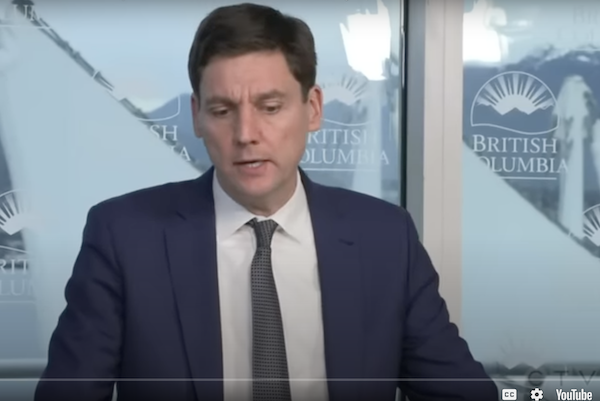
While pressure was building, Robinson and Eby both appeared to be feeling their way through uncharted territory. Robinson apologized – twice. She also offered to take anti-Islamophobia training.
“My words were inappropriate, wrong, and I now understand how they have contributed to Islamophobia and anti-Palestinian racism,” she said.
Parallels Robinson drew between Indigenous peoples in British Columbia and Jewish indigeneity in Israel also brought condemnations, and she specifically apologized for those remarks.
“The experiences of First Nations people are not mine to manipulate,” she said. “That was wrong and I am deeply sorry.”
“Her comments increase divisions in our province,” Eby told media. “They increase the feelings of alienation of groups of people, especially people of Palestinian descent and people who are concerned about the death and the destruction in Palestine that is happening right now.
“She has apologized unequivocally, as she should. And she’s got some more work to do,” Eby said. Robinson, the premier told media, was in the process of reaching out to community leaders to repair the damage her remarks caused.
What happened in those hours sowed the seeds for further conflict within the party, including, Robinson now says, the premier’s refusal to allow her to do what she could do – and wanted to do – to repair the damage she caused.
Was she wrong?
Some commentators have defended Robinson, saying that pre-state Israel was indeed a crappy piece of land in terms of arability. Robinson reflected on what she said and the reaction to it.
“I said things that I did not intend to hurt anybody,” she said. “I did not intend to make Arab, Muslim or Palestinian people feel like they are ‘less than.’ I understand that just the way I described Israel made them feel like they were poor land stewards, that they somehow were to blame for the conditions.”
Nevertheless, she said, she did not invent a narrative that Mandatory Palestine was a poor piece of land, she said.
“Other people have characterized [pre-state] Israel in that way,” she said. “I didn’t create that narrative. I was repeating a narrative that others had stated, from Mark Twain to land economists.”
For the purposes of historical accuracy, she said, she blames the Ottomans, whose empire had controlled the land for 400 years, for a lack of economic vibrancy in the region. That long-ago history, though, does not mean her words did not affect contemporary audiences, she acknowledged.
“Those words impacted them,” she said of people who expressed disappointment and other emotions at her remarks.
Criticism she rejects, though, are assertions that she espoused hate.
“I didn’t espouse hate,” she said, slowly, quietly and firmly. “I said words that hurt people. There was no hate in those words.”
These nuances, for what they may be worth, made no difference when it came to Robinson’s continuation as a cabinet minister.
Jumped or pushed?
“The depth of the work that Minister Robinson needs to do, in order to address the harms that she’s caused, is significant,” the premier told media Feb. 5. “[S]he screwed up, she made a really significant error and so we need to address the harm that was caused by that.”
At a news conference, Eby said a “joint decision” was made that Robinson would leave cabinet.
While she agreed to that wording, Robinson told the Independent, that is not a correct assessment of what happened.
“I didn’t think that I needed to leave cabinet,” she said. “That was not my choice. The premier was insistent that I had to.”
Robinson says Eby seized on something she said during discussions around her future.
“I said, ‘If you are asking me to step down from cabinet, if that’s what you want, I will,’” Robinson recalled. “It’s not what I want. And he said, ‘I can’t see a path forward for you in cabinet.’ So I said, ‘So you’re asking me to resign.’”
Robinson said she insisted the announcement from the premier’s office say that the premier asked her to resign.
“And they said, no, you offered your resignation,” Robinson continued. “And I said … the most you’ll get from me is that it was a joint decision and that’s what the press release [said], a ‘joint decision.’ But … let’s be really clear, as I said in my letter [resigning from caucus], I was told that there was no path back.”
Eby denies this.
“I did not remove her,” the premier told the Independent. “I can certainly believe that she didn’t want to do that, but I did accept her resignation.”
Leaving caucus
Robinson’s successive apologies and commitment to undergo anti-Islamophobia training didn’t save her cabinet job. But, she said, she was committed to making amends.
“The concept of teshuvah [repentance], for us as Jews, I take it seriously,” Robinson said, “It’s not enough to say you’re sorry, what are the deeds that go with it?”
Robinson came up with an idea she terms “The Project.”
In the aftermath of her firing, followed by the vandalizing of her constituency office and a death threat, Robinson and her family took off for a week in Mexico to recuperate.
“I called the premier from Mexico and said I have an idea, what do you think?” she recalled. “It was around outreach, working with the [Jewish and Muslim] communities, bringing them together … what did he think?
“And he said that’s a really interesting idea, let’s think about it,” Robinson said.
When she returned from Mexico, she talked to the premier’s chief of staff, Matt Smith. She fleshed the idea out some more, proposing that she and perhaps someone from the civil service – a Jewish person and a Muslim person – “would work with these communities and try to find ways to do dialogue and engagement and break bread and do the things that bring about peace and what could that look like,” said Robinson. She discussed the concept with Deborah Lyons, Canada’s special envoy on Holocaust remembrance and combating antisemitism, who was supportive and offered to do anything she could to support the effort, Robinson said.
After contemplating the idea, Smith came back with his decision: “Too political,” Smith said, according to Robinson.
The premier told the Independent that the idea that a civil servant would work on the project with an elected official is what was “too political.”
Robinson doesn’t believe that. “It was more, we’d prefer to be silent on the whole thing,” she said.
Silence, she contends, is a root of the entire problem – not just with her firing but around the government’s approach to antisemitism. The premier and the government, she contends, are more concerned with success in this fall’s election than with doing the right thing.
“We are in election mode,” she said. “And, frankly, we’ve been in election mode since [Eby] became the premier [in November 2022]. I get it. I’m a politician. I understand the gig, I know how these things work.
“However,” she said, “we are also government. We are a party trying to get reelected and we are government, and you have to be able to do both at the same time. It’s hard. I’m not saying it’s easy. But you can’t give up the governing part and just do campaign mode. You campaign and you govern simultaneously and I think what’s happened is they stopped governing. A government says, we have a problem, what are we going to put in place to help this community that is being terrorized? And it’s controversial, because there are others who think it’s appropriate to terrorize this community. I think what governments are supposed to do is bring people together. Right now, the actions are ripping people apart.”
The fact that the premier’s office would not allow her to engage her colleagues in a broader discussion about both antisemitism and Islamophobia led her to believe there was nothing she could do that would satisfy the government.
“I committed to a number of deeds and have acted on them and that still wasn’t good enough,” she said.
While the government seemed unsatisfied with her efforts, many Muslim people have been more forgiving, she said. Many have expressed forgiveness for her words and accepted her apologies – she has accepted Iftar invitations and extended seder invitations to Muslim friends and acquaintances, she said.
“There are Arab and Muslim leaders that I have had wonderful conversations with, heartfelt conversations,” she said. “I could hear the agony in their voice and they could hear the agony in mine.”
That kind of amity, though, was not something she found among her NDP colleagues. On March 6, her 60th birthday, Robinson released a statement resigning from the NDP caucus.
Harsh words for Heyman
The day after Robinson’s resignation, the premier’s office organized a news conference at the Legislature. George Heyman, BC minister of environment and climate change strategy, told the media that he took exception to the assertion that Robinson’s resignation represented “our government [having] lost the only Jewish voice in our caucus or cabinet.”
“They should know,” said Heyman, “that I’m also Jewish. I grew up as a Jew.”
His experience in the NDP, Heyman said, does not comport with Robinson’s perceptions.
“My experience is that our caucus and our cabinet are deeply committed to fighting antisemitism, to opposing hatred and I have found them to be personally supportive of me on an ongoing basis,” he said.
“He was trotted out as the new Jew, which was a shonda [shame], as they say, on so many different levels,” claims Robinson. “I believe George was put up to it. I know how things work. They didn’t want me to be the only Jewish voice.
“But George doesn’t identify as a Jew,” she said. “He’s told that to so many people. He’s not connected to the community.”
Robinson thinks Heyman allowed himself to be used.
“You thought it was OK? So, the premier asks you, you could have said I’m not going to do that.”
Heyman takes exception to Robinson’s comments about his identity and especially about the idea that he was put up to anything.
“People who know me know that I don’t do things that I don’t want to do,” he told the Independent. Heyman said he was moved to address the issue as soon as he heard opposition MLAs claim the government had lost its only Jewish voice.
On the larger issue of his identity, Heyman said it is up to individuals to self-define.
“I think it’s actually my and every Jew’s right and responsibility to determine in what ways they identify and connect with their own heritage, which is not the same as practising a particular religion,” he said. “My position as a child of Holocaust refugees and as a grandchild of Holocaust victims is, I think, fairly well known. I certainly haven’t hidden it. I may not be a member of the Jewish community in the same way that Selina is. I am not a practising Jew, but to say that I don’t identify as a Jew I think is simply inaccurate.”
Is it antisemitism?
Robinson said media have tended to misrepresent her comments about antisemitism in the NDP. She did not say the party was rife with antisemites. Her letter of resignation from caucus included several incidents – and most of these were matters of record. She herself has experienced antisemitism directly only from two colleagues, she said.
Immediately after the Oct. 7 terror attacks, Robinson said, she sent a message to her colleagues noting that the Jewish community in British Columbia was experiencing trauma as a result of what was happening, including the murder of a young Vancouver man, Ben Mizrachi, and expressions of solidarity and condolences were in order.
Days later, she said, two of her colleagues – Aman Singh, MLA for Richmond-Queensborough and parliamentary secretary for the environment, and Katrina Chen, MLA for Burnaby-Lougheed – responded to her message by stating that the government should express solidarity with Palestinians.
“Three days after, maybe four days after the massacre, [they] felt that it was appropriate to put out a statement about how Palestinians were treated,” Robinson said. “Ben Mizrachi hadn’t been buried yet. The [Israeli military] hadn’t responded.”
Robinson was outraged.
“This isn’t about that,” she said of responding to expressions of Jewish suffering with demands for solidarity with Palestinians. “Could you not take a moment – a moment – to reflect on how horrible it is that a terrorist group came in and slaughtered 1,200 people? Just acknowledge it. Just acknowledge that that was wrong and we need to fight against terrorism.”
Robinson does not understand how people cannot see antisemitism in the erasure of Jewish suffering.
“Jewish suffering is discounted,” she said. “It’s [perceived as] not real, it’s fake. It has no value and diminishes another group of people who are suffering.
“This isn’t a competition of who is suffering more,” Robinson said.
She called the premier immediately upon seeing the messages from Singh and Chen.
“I said, I can’t deal with this. I can’t deal with those two. I just can’t,” she said. “And he said, let me deal with it. I was grateful. It felt like he had my back.”
Robinson never heard from Chen, whose social media feed frequently shares Palestinian memes and messages. On the day Robinson released her resignation letter this month, Chen tweeted: “Not wanting to see more kids and people die in Gaza is not antisemitism.”
An hour after she took it up with the premier, Robinson said, she heard from Singh.
Neither Singh nor Chen responded to the Independent’s request for comment or clarification on Robinson’s version of events. However, the Independent has seen the text Robinson referenced and, in it, Singh called the Oct. 7 attacks “absolutely horrific” and said Hamas “should be brought down.” He also expressed empathy with Robinson and her family in Israel.
“I wanted us as a caucus just to recognize the pain in Gaza as well,” he wrote, adding that he was not calling on the government to make a statement in that regard, “[b]ut internally I felt that needed to be said.”
Additionally, the original email Singh sent was on Oct. 12 and, therefore, after the beginning of Israel’s military actions, not before, as Robinson had claimed.
While Chen and Singh did not comment to the Independent, Heyman defended them, also noting that the emails Robinson cited were “private communications within caucus.”
“It was disturbing to me that her interpretation of actions of a number of my colleagues were that they were antisemitic,” Heyman said. “These are colleagues I respect. I’ve had many conversations with them and I know how deeply committed they are to fighting antisemitism and to fighting all forms of hatred.”
Robinson, in any event, did not consider Singh’s text an apology and did not respond. Nor has she spoken to Singh since.
“If he had come up to me and said, ‘Selina, you never acknowledged my apology, can we talk about it?’ I would have,” she said. “But I really felt like he did not get it.”
Not getting it is, Robinson thinks, the problem. It is not that her colleagues are overt Jew-haters, but that they do not know what antisemitism looks like and refuse to take the time to find out.
“What I tell them is you don’t know enough about antisemitism in its newest form,” she said. “I think for them it’s name-calling, swastikas – I think that for them is really clear. The new form of antisemitism that we are seeing … [includes] the delegitimization of Israel, [the idea] that Jews are responsible for Israel’s political decisions or military decisions, Israel as colonizer, Jews as white people, therefore, the oppressor – I don’t think they have a frame for how to make sense of that.”
Criticism of Israel is not antisemitic, she said. Denying Israel’s right to exist, which is the position of many of the people who wanted her out of office, is.
“What you’re saying is Jews shouldn’t have a homeland, that their history of continually being pushed out of those lands over time, over millennia, you want that to continue,” she said. “If you don’t recognize the legitimacy of Israel as a nation-state, then that contributes to Jew-hatred.”
Taking the North American settler-colonialism model and applying that lens to Israel and Palestine is simply wrong, she said.
“It is inaccurate, it is a false narrative, it is patently not true. And, as a result, they are engaging in antisemitism,” said Robinson, whose own comparison of North American indigeneity to the Middle Eastern model drew condemnation. “I don’t think that they want to be antisemitic but they are, because they don’t understand and they’re not taking the time to learn how that history is different from this history here in North America. I think that’s where those folks are going wrong. What’s the solution? Education. Learn the history. And you’re not going to get it from TikTok and you not going to get it from Twitter, so you need to do some – I’ll use the premier’s words – you need to do some deep learning.”
When it comes to her former colleagues, Robinson believes their culpability comes from a combination of fear of failure and refusal to learn.
“They don’t recognize this form of antisemitism and so they are silent because they’re afraid of saying the wrong thing one way or the other,” she said. “But their silence is deafening and no one is saying, I want to learn more about this.”
Though that’s not quite accurate. One colleague, after she left cabinet, and another after she left caucus, reached out to Robinson and said they have been looking to learn more about antisemitism.
One asked her why they, as elected officials, are not trained in this.
“Well, you’d better ask the premier,” she responded.
Battling Zionists
In her letter of resignation from caucus, Robinson mentioned several colleagues by name, among them Mable Elmore, MLA for Vancouver-Kensington. Elmore’s example is one that has come up repeatedly among Robinson’s defenders in recent weeks as an example of someone who has gotten away with comments that are arguably worse than anything Robinson expressed.
In November, Mable Elmore rose in the house to make a routine statement. Instead, Robinson said, she went off script and delivered a two-minute talk about people dying in Gaza.
“But she never made reference to the massacre on Oct. 7,” Robinson said. “She never tied this as a response to terrorism.”
Elmore is parliamentary secretary responsible for antiracism initiatives under the attorney general.
Leaders in the Jewish community, Robinson said, have long been wary of Elmore. At the start of her political career, Elmore got in hot water for voicing a conspiracy about “vocal Zionists” in her workplace that she and other union activists had to “battle.”
“They were always anxious about Mable, given her history,” said Robinson of leaders in the mainstream Jewish community. “When she was made parliamentary secretary for antiracism, [Jewish communal leaders] expressed concerns to me but they said … we believe people can change [and] learn, and so they went along with it.
“Then, when Mable did her two-minute statement in November that sort of disconnected what’s happening in Gaza right now from the attack on Oct. 7 and left out a big chunk of the story, [Jewish community leaders] were outraged,” said Robinson. “They were absolutely outraged. I went to the premier’s office with my own outrage and then, of course, communicated the community’s outrage.”
Jewish leaders, according to Robinson, were asking for Elmore to be taken off the antiracism file completely. Instead, she said, the premier left Elmore in charge of antiracism initiatives but removed her responsibility for liaising with the Jewish community on issues involving racism. Dealing with the Jews on antisemitism and broader antiracism approaches would be handed over to Attorney General Niki Sharma.
“This is where the story gets really interesting,” Robinson said. Eight weeks after the premier removed antisemitism and liaising with Jews from the government’s point person on antiracism and handed those responsibilities over to the more senior attorney general, Robinson reached out to Sharma after the Vancouver Police Department released a report that anti-Jewish hate crimes in the city had spiked 62% in 2023.
“It’s been eight weeks now since [Sharma] has been responsible for the file. The Jewish community is reeling, numbers are through the roof,” said Robinson, who said she asked Sharma what the government was doing. “She had done nothing from November on. She hadn’t met with the [Jewish] community. She had no plan.”
Sharma promised to get Robinson a brief on how her department and the government intended to address the increase in hate-motivated crimes against Jewish individuals and institutions. Robinson never received it.
Disputed events
In the hours after Robinson released her letter to caucus, Premier David Eby addressed the controversy repeatedly with media.
“I wish she had brought her concerns to me directly so we could have worked through them together,” he said at one point. Later, he said, “She didn’t feel safe with me to bring forward her concerns and she felt she had to resign. So, I’ll examine that.”
Eby’s comments infuriate Robinson. “When the premier says that I never came to him – this is the part that really makes me crazy – I did,” she told the Independent. “I was even coming with solutions.”
Those solutions did not seem to move the dial in terms of any redemption Robinson might have expected for what she sees as good-faith efforts to make amends and her proposals to help address antisemitism and Islamophobia in government.
Target on her back
Robinson felt she had a target on her back – and not only since the “crappy piece of land” incident.
“There were targets even during convention,” she said. Before the BC NDP convention last November, Robinson warned the premier’s office that several delegates and groups were going to bring forward emergency resolutions about the war in Gaza.
“I kept saying, we are a subnational government, we don’t do international relations,” Robinson said. “I don’t even know why we would entertain international commentary.”
Convention organizers apparently felt there was a need to allow some delegates to blow off steam. Robinson said she and others then strove to create a relatively balanced resolution, “and that work happened behind the scenes.”
“But there were people calling for my head back then, back in November,” she said.
In her capacity as minister responsible for BC postsecondary institutions, Robinson gained the wrath in February of the Federation of Post-Secondary Educators of BC and the Canadian Association of University Teachers, who called on Eby to oust Robinson. The latter group accused Robinson of undermining “the democratic principles of freedom of expression, academic freedom, and a college and university system free of direct manipulation by the provincial government” because Robinson had retweeted a call for Langara College to fire Dr. Natalie Knight, an
English instructor who referred to the mass murders of Oct. 7 as “amazing” and “brilliant.”
As a result of Robinson’s vocal and visible presence on these issues, she said, there were people “paying very close attention to what I said, how I said it, when I said it. So, I was a target – I still am a target, I think.”
Warning signs?
While Robinson has felt a target on her back, including from some in her own party, there is a larger trend that has nothing directly to do with her, arguably going back to 1967 or before, when the Canadian left’s approach to Israel and Palestine began transitioning from a largely pro-Zionist position. With a few notable exceptions, NDP elected officials and rank-and-file members for several decades now have aligned more with the Palestinian cause than the Israeli one. While criticism of Israel may or may not be fair, depending on context, some people, including some longtime party members, have written the party off as poisoned by antisemitism.
Bernie Simpson is one of only a handful of Jewish British Columbians ever elected to the provincial Legislature. He was the New Democratic MLA for Vancouver-Fraserview from 1991 to 1996, but his roots in the party go back decades earlier. He was mentored by Dave Barrett, the first and still only Jewish premier of the province, and Simpson was at the upper echelons of the NDP from the 1960s.
Throughout that time, he told the Independent, he struggled against far-left “ideologues.” He eventually left the party about 25 years ago, in large part because of the prominence of anti-Israel voices like Svend Robinson and Libby Davies.
“I always felt, in the years that I was involved with the NDP, that there was underlying antisemitism,” he said. “I didn’t realize the extent of antisemitism in the NDP until Selina brought it to the world’s attention, and good for her.”
Simpson believes Eby is beholden to certain segments of his caucus.
“He has to appease the left-wing ideologues or else he’d have a revolt and probably they could undermine his leadership,” Simpson said. “They are quite capable of doing that, the left wing.”
“Can a party be antisemitic?” Robinson asked. “Well, people make up a party. So, it depends who is there.”
In 2021, she called on the resolutions committee of the federal NDP convention to get some perspective on foreign affairs.
“When they had their convention, they had the top 25 resolutions [and] 16 of them [or] 15 of them, were anti-Israel,” she said. “Really, people? Do you not care what’s happening in Chad, or the Congo, or to the Uyghurs? What is your obsession? I reached out to them and I called the people in charge of the resolutions committee and the response was, and I quote, ‘It has been ever thus.’ I was stunned.
“Can you not reflect on your obsession and where that’s coming from?” she asked. “I get it if you have one or two [resolutions about Israel]. I don’t like Israeli government decisions, what they’re doing. For sure, challenge this [Israeli] government in terms of the decisions that they are making. You only have so much time to debate your resolutions, but you want to spend three days debating Israel? Then you’re not a party I can take seriously to represent us as Canadians. Not on China, not on Iran, not on these really big, despotic nations. Nope. It’s just the Jews.”
Under the late Jack Layton, who was leader of the federal NDP from 2003 to 2011, Robinson said, things were not as bad as they are now.
“I blame Jagmeet Singh,” she said of the federal NDP leader. “I hold him completely responsible for the rhetoric and the outrageousness that we are seeing. He’s party leader. This is on him…. His attacks on me because I described Israel pre-1948 [Israel] as a crappy piece of land and his vociferousness towards me was vile.”
Singh had called Robinson’s comments “not only factually wrong, but offensive and irresponsible” and that “elected leaders must be voices for peace and justice.” The federal NDP leader said he had conveyed his “serious concerns” to Eby.
Singh’s office did not respond to the Independent’s request for comment.
Decision to retire
When Robinson left cabinet, she let it be known that she had earlier decided not to seek reelection in this fall’s provincial election.
She had planned to announce her retirement on March 6, her 60th birthday. After three terms as an MLA, following two terms on Coquitlam city council, Robinson thought it was time to leave public life after 16 years. In December, she shared the news with the premier.
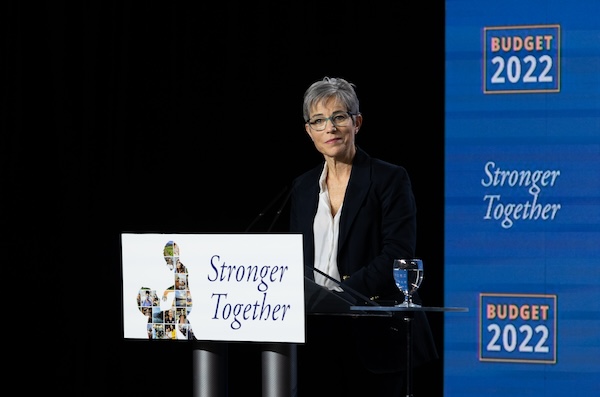
There were lots of reasons to wind up her elected service, she said. Her (adult) kids are talking about having kids and she wants to be a hands-on bubbe. Her father turns 84 this year and she wants to spend more time with him, and with her husband’s parents, who are of a similar age. Her husband, Dan, wants to travel.
The premier, Robinson said, was kind when she shared her decision with him late last year.
“He was surprised I wasn’t running again,” she said. “He thought I’ve been a very competent minister. He had lots of nice things to say about me.”
But there was something else.
“I said, caucus hasn’t felt the same since Oct. 7,” she told Eby who, she said, opted not to ask her about that. “It just hung. He didn’t ask. He didn’t say, tell me more about that or what do you mean – he knew what I was referring to, of course – but he didn’t push, he didn’t pursue. It saddened me a little bit because I would have hoped he would have been at least a little bit interested to understand what that was about.”
Still, she acknowledges, the purpose of the call was to share her retirement decision and the conversation soon turned to logistics – when she would tell the party brass, whether she had groomed a successor, when to go public.
March 6 did involve a major announcement, of course, but it wasn’t about the decision that she wouldn’t run in the next election. Instead, she released an open letter to colleagues, telling them why she would no longer be sitting as part of the New Democratic caucus.
Death threat and vandalism
The hate Robinson experienced after her webinar comments went viral was extreme. At her offices, voicemail reached capacity. Staff were days behind keeping up with the bombardment of email.
It was a Saturday when an email came in threatening to shoot Robinson in the head, but staff didn’t discover it until four days later. They knew the procedure, having dealt with a similar incident a year earlier – a threat against Robinson not because she is a Jew but because she is a woman. Staff found the death threat email the same day they had arrived at the Coquitlam office to find it vandalized and festooned with hate messaging.
“The police have found the perpetrator,” Robinson said. The email came from the United States, so US Homeland Security and the FBI are involved. “It’s legitimate and it’s credible. It helps that it’s someone at a distance but it’s also in a place where guns are easily accessible, so it’s a bit of both.”
Robinson’s husband now keeps a baseball bat next to the bed.
Kindness amid chaos
To look at social media posts targeting Robinson is to dive down a rabbit hole of varying degrees of outrage and a great deal of hatred. In the real world, she said, she has experienced an outpouring of compassion.
An acquaintance sent her a bouquet of blue and white roses – Israel’s colours. Robinson was walking in the park with earphones in and a passerby made the heart sign. Heaps of cards, letters and emails have poured in. People have sent art, including a rendering of a woman reaching for the sky, which is displayed prominently in her office.
“I want to weep, actually, because it feels validating,” she said.
But that outpouring of support from the public is not mirrored in the reaction of her former cabinet and caucus colleagues, she said.
While Robinson’s experiences among the NDP officials with whom she spent more than a decade is a testament of profound loneliness, that is not entirely the case, she said. Some people have been dependable and supportive. She can count them, she said, on one hand. And she won’t mention them by name for fear of throwing them to the wolves.
“I’m not going to single them out, only because I’m worried about their backlash,” she said. “I want to protect them for being there for me.”
What ifs …
When she left cabinet, Robinson cleared out her personal possessions from her ministerial office. The day the Independent visited her, she had just been going through those boxes.
“I came across a card from John Horgan, when he stepped down,” she said, referring to the former BC premier, who retired in 2022, and was replaced by Eby. The card, she said, “just talked about how much he values my input and that I brought all of me to cabinet.
“He trusted my judgment vis-à-vis the Jewish community,” Robinson said. “He really wanted to understand that he was doing right by the Jewish community, so he would regularly check in with me about what did I think. I would say, ‘You were a mensch.’ He really took to that word, ‘Was I a mensch?’ ‘You were a mensch.’”
Might things have played out differently if Horgan had been in the top job when all this blew up? Robinson believes so.
“I think he might have heard my concerns differently earlier on,” Robinson said. “If I would have told him that, since Oct. 7, caucus hasn’t felt the same, he would want to know why. What’s changed? What’s it like for you? And that may have had a different outcome.”
When the webinar comment grew into a crisis, Robinson suspects the former premier might have responded differently than the current one did.
“I think he would have stood by me. I think he would have weathered the storm,” she said.
Second chances?
One of the things that Robinson’s defenders, including Jewish community leaders, have pointed out is that everyone seems to get second chances but the Jew. The offences outlined in Robinson’s letter of resignation, as well as documented incidents like Elmore’s multiple transgressions, suggest a willingness to forgive, if not forget.
When Robinson was hauled on the carpet for her comments and thrown out of cabinet within days, the official voices of the mainstream Jewish community noted that, mere days earlier, the Jewish community had been asked – and agreed – to overlook an egregious misstatement on the part of the premier himself.
On International Holocaust Remembrance Day, Jan. 27, the premier’s social media feed noted the occasion and declared: “We stand with the Muslim community throughout Canada on this sorrowful day of remembrance.”
The message was soon taken down and an apology posted.
“Do you know who managed that debacle for the premier’s office?” Robinson asked. “Me.”
Robinson was not the only one to catch the grievous error, of course. BC United, the official opposition party, screen-captured the post before it was deleted. Robinson, meanwhile, was on to her leader’s office to get to the bottom of it.
“I spoke to folks in the premier’s office,” she said. “I learned who made the error. I was assured it was an error.”
An apology is not enough, she told them. “You need to explain how this could happen.”
The explanation was that two days after International Holocaust Remembrance Day was the anniversary of the 2017 Quebec City mosque attack during which six people were killed and 19 were injured. A lower-level social media staffer had apparently mixed up the messages for the two separate days.
Until the clarification, some people wondered if the post was a deliberate act of baiting the Jewish community on one of the most solemn days of the year. Robinson is confident it was simple human error.
“I have to believe that, otherwise I’m way too cynical about the world,” she said. “I have to take people at their word … and that’s what I guess is heartbreaking for me, that people couldn’t take me at my word. They chose to think the worst of me, after all this time.”
Political fallout
Robinson’s departure – and the broader issues of antisemitism she raises – absorbed the Legislature and the press gallery for days.
Kevin Falcon, leader of the BC United official opposition (formerly known as the BC Liberals), has repeatedly called for an independent investigation into what he calls “the antisemitism that is rife not just within the government but within their own cabinet, caucus and party.”
Speaking with the Independent, Falcon raised what he and so many others have called a “double standard” in the treatment of Robinson, while there are members of the NDP who have not apologized for intemperate remarks and yet have suffered no consequences.
“I can’t help but note the worst that Selina could be criticized for is using perhaps a poor choice of words,” said Falcon. “But she did the honourable thing and fully withdrew the comments, apologized for the comments and, even after saying that she would go through anti-Islamophobia training, whatever that is, [it] still wasn’t enough for the premier to [not] drop her out of cabinet, which is in stark contrast to how they’ve dealt with other people within their own government who have made terrible statements in the past.”
Recent concerns about racism against Indigenous people in the healthcare system, Falcon said, resulted in quick action.
“They couldn’t move fast enough then to appoint an independent investigation into the allegations of racism in the healthcare system,” he said. “But, when it comes to investigating antisemitism within their own government, caucus, cabinet and party, well, nothing to see here. They just continue to delay.”
Another double standard, Falcon said, is the different reactions to claims of antisemitism versus other forms of racism.
“They’re always out there professing to be so concerned about racism, except when it comes to racism against the Jewish community,” he said. “The double standard is certainly so glaringly obvious. That’s the part that feels so remarkably different. That’s the part that none of us can just get over. It’s amazing to me that they say all the right things about [being] so concerned about this, we have thinking to do, we need to create safe spaces and this word salad of woke-isms that they can spew out very easily, but fail to address the two fundamental issues that concern us on this – the double standard as a result of Selina being fired out of cabinet and people who have said far worse antisemitic statements or tropes [but who] continue to serve, some of whom have never apologized.”
Falcon said that critics of Israel, like those who targeted Robinson, are missing crucial moral principles.
“In war, tragically, there are always innocent lives lost,” he said. “It is an unavoidable aspect of war. That breaks my heart when I see innocent people dying on both sides.
“We have to understand some important principles,” he continued. “One is that Israel has a right to exist and Israel has a right to defend itself.”
Politics, legendarily, makes strange bedfellows. Robinson seems to have few reliable friends among her former colleagues, but Falcon said her new seatmates are literally and figuratively on her side – she is now on the opposition side of the House, awash with BC United, Conservative and Green MLAs.
“She’s got a lot of supporters on the opposition bench,” Falcon said.
John Rustad, leader of the BC Conservative party, a long-moribund party that is showing surprising strength in opinion polls, said his heart goes out to Robinson.
“That Selina was brave enough to share that I think speaks volumes to what is going on within the caucus and within the [New Democratic] party,” Rustad told the Independent. “David Eby has known about this for months and he’s refused to take action. I think the province is not interested in having a premier that won’t stand up and defend British Columbians and Canadians.”
The Conservative leader echoes Robinson’s allegations that the premier is more concerned with politics than fighting antisemitism.
“I don’t think they are looking to doing what’s right,” he said, suggesting that electoral calculations based on the disparity of sizes of the Jewish and Muslim populations are driving their decisions. But, Rustad warns, this approach could blow up in their faces.
“I think, quite frankly, they are miscalculating where people in this province are because I think people are not interested in antisemitism, they’re not interested in hate, they want a government that’s going to stand up for everybody in this province,” he said.
The letter from Islamic leaders warning that New Democrats would be unwelcome in Muslim sacred spaces that came shortly before Robinson’s firing was concerning, Rustad said.
“When I saw it, the first thing that came to mind was government bowing to threats,” he said.
“It takes courage to do what Selina did, it takes courage for a government to stand up for what’s right and that’s where David Eby has failed,” said Rustad. “I was, I guess, a little shocked to see how quickly David Eby backed down and bowed to that pressure that was put out there. It was disappointing from my perspective because government sometimes has to do things that some people may be upset with because it’s the right thing to do.”
BC Green Party leader Sonia Furstenau called the Oct. 7 attacks “a devastating and terrible event,” and said that elected officials in this province have a responsibility to address the local repercussions of overseas developments.
“We really have to focus on the people of BC and that we are taking seriously the reality of antisemitism,” she said. The rise in hate crimes, which began most notably during the COVID pandemic, was addressed in a report from the Human Rights Commissioner in 2022. Furstenau believes the commissioner should consider actions to confront the growing prevalence of antisemitism now.
“It may be that the next steps could be for the Human Rights Commissioner to take on a project to help us recognize, address and reduce antisemitism in BC,” she said. “I think, given the very complicated nature of the war between Israel and Hamas, that we could be looking for the Human Rights Commissioner to look at antisemitism and Islamophobia and, really, how do we come out of this as a place that’s less divided and has less hatred?”
Responding to Robinson’s expressions about antisemitism in government, Furstenau said the former minister needs to be taken at her word.
“Selina is the expert on what Selina has experienced and we have to respect that,” said Furstenau. “When somebody indicates that they have experienced racism or discrimination, it’s not our place to question that.”
“I’m fine”
Robinson’s emotional health has been a concern for friends and supporters. Few people can imagine the impact of being at the centre of a public maelstrom like the one Robinson is enduring.
Amid all this, there have been physical health realities.
In 2006, Robinson was diagnosed with a rare form of intestinal cancer. She beat it. Then, in February 2023 – “February’s been a bad month for me the last few years,” she said – Robinson shared the news that routine screening indicated that cancer had returned.
After treatment, she got the good news eight months later that the tumour they had found in February was gone.
“I’m fine,” she said. “I’m on the chemotherapy that I’ve been on for years. I will be on this medication for the rest of my life.”
The treatment is not without side-effects.
“It makes me a bit more tired than most other people, although my husband says that might not be a bad thing in terms of people keeping up,” she said. “I get muscle cramps. They are inconveniences rather than serious implications. I really am fine.”
The joyful news that the cancer was gone came on Oct. 5.
“Lots of happy tears around that,” she said. Two days later, news from Israel turned those happy tears to something very different.
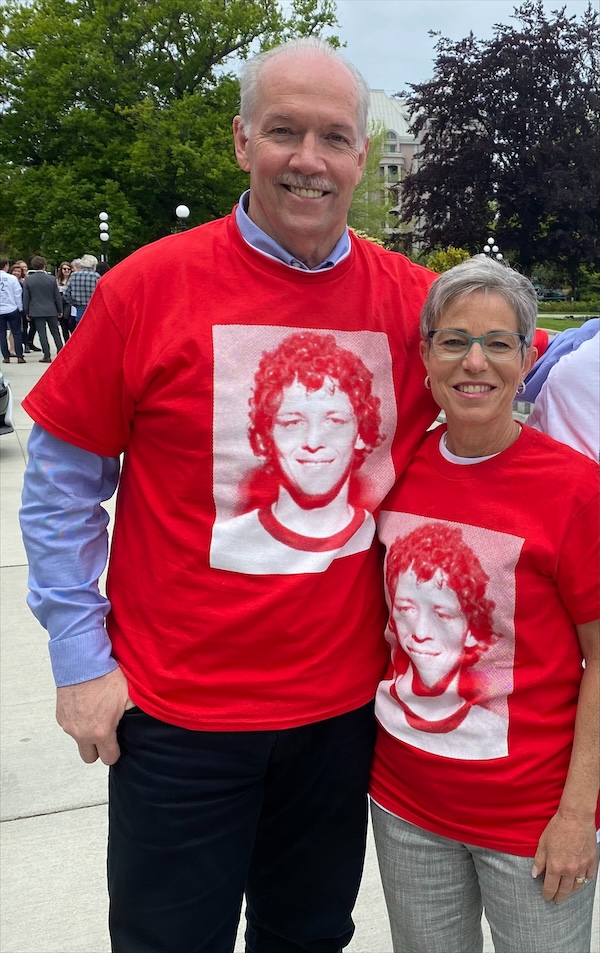
Points of pride
Although she didn’t share the news with the public until the controversy arose, Robinson was already planning for a life post-politics. She will not be the NDP candidate for Coquitlam-Maillardville in the election scheduled for Oct. 19. Every indication is that she would have been reelected easily. When she first ran provincially, in 2013, it appeared on election night that she had lost. When the final votes were counted in the days after, she squeaked in by 41 votes. Her next two elections were not at all close. In 2017, more than half the voters in the riding chose her and, in 2020, she nabbed just a hair under 60% of the vote.
During her first term, Robinson was an opposition MLA. When John Horgan formed government (under an agreement with the BC Greens), he appointed Robinson minister of municipal affairs and housing. This was a daunting role in one of the most expensive places to live in the world.
Several things really stand out for her from that time.
The BC government, under Horgan, with Robinson in the housing portfolio, was and remains the only provincial government to fund housing on Indigenous reserves.
“It’s a federal responsibility, but this is ridiculous,” she said. “They are British Columbians and they need housing.”
Another achievement she cites is that, when she became minister, she undertook to meet with officials from every municipality in the province – close to 200 local governments – and she said she still runs into current or former mayors and councilors who credit her for engaging with them.
After the election in 2020, Robinson was promoted to finance minister. Achievements from that gig? Robinson throws her arms in the air without hesitation: “The biggest surplus in the history of our province.”
Her control over the province’s wallet came in the midst of the COVID pandemic, with all that entailed. In addition to sound bottom lines, she said the government brought down “good budgets that delivered for people and that made a difference.”
When Eby replaced Horgan as leader and premier, Robinson was shifted to the ministry of postsecondary education and future skills.
In this role, she takes pride in removing the age limit for former youth in care to access postsecondary education. Those who age out of the foster system had been able to obtain tuition funding and additional supports – but only until age 26.
“If you’re a former youth in care, it takes a longer time to figure out how to adult,” said Robinson. Now, these young people (even if they are no longer so young) can access educational funding and cost of living supports to reach their academic or vocational goals.
It was also in her responsibility for postsecondary education that Robinson found herself on the frontlines of campus turmoil, with anti-Israel protests by students and pro-terrorism comments by some BC academics. She convened a meeting of the heads of all BC’s colleges and universities and laid out expectations for civil, peaceful dialogue on campus.
Voting advice?
The firestorm over Robinson’s comments, charges of antisemitism in the government and public service, complaints that the premier is not taking matters seriously enough and the related controversies come only months before British Columbians go to the polls. These crises are not coincidental to the proximity of the election, Robinson contends, but are a direct effect. The government is doing what they think is politically helpful, rather than what is right, she said.
So, where does that leave Jewish and sympathetic voters who would have cast a vote for Eby’s party in October but now feel adrift, wondering if the NDP represents their interests?
“I feel very adrift as well,” she said. “I think everyone has to make up their own mind. There is no perfect party. If you’re going to bring about change, then you need to use your voice to bring about change. That’s what this is all about.”
She puts the onus on members of her own (former) party.
“If people are silent, if New Democrats are silent on this, then you are complicit,” she said. “If you think this is wrong, if you think the direction the party is taking vis-à-vis Jews [is wrong], then you need to say something. You need to take action on it. That means challenge what’s become the status quo.”
Future plans
“Boredom terrifies me,” Robinson said.
Though boredom might seem a welcome respite from some of the emotions she has endured in recent weeks, Robinson insists she is not done contributing to the community. She just doesn’t know yet in what capacity.
“I don’t know what I’m going to do,” she said. “I’ll find something to do.”
“I’m learning to knit,” she said. She’s got local food maven Susan Mendelson’s classic cookbook Mama Never Cooked Like This and she’s thinking of pulling a Julie & Julia by trying every recipe in the book and posting them to social media.
Robinson has traveled across much of Western Europe but not Spain and she is reading about that country and its history.
She has promised her husband she will not make any long-term commitments before January.
Until the writ drops for the next election, she remains MLA for Coquitlam-Maillardville.

